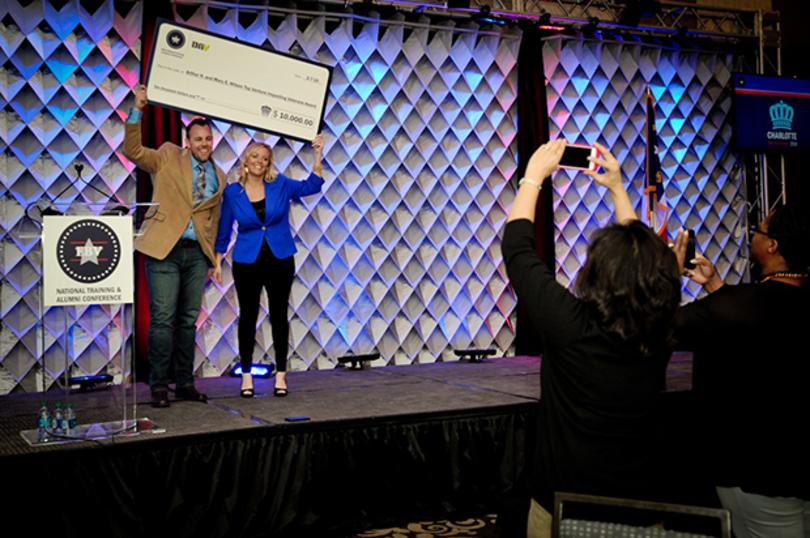Participants reflect on benefits of entrepreneurship competition for veterans with disabilities

Winners were chosen in the D'Aniello Family Foundation Business Plan Competition in Charlotte, North Carolina. The earnings included more than $110,000 to a field of 10 finalists. Courtesy of Syracuse EBV
Two days before starting the Entrepreneurship Bootcamp for Veterans with Disabilities (EBV) program at Cornell University, Paul Kilgore was diagnosed with prostate cancer — for the second time.
But after a 21-year career in the United States military, Kilgore wasn’t going to let anything stop him from starting a successful business. He used his diagnosis as motivation to begin working on ways to make his upstate New York brewing company, WAORGANY, a reality.
After completing nine days of an entrepreneurship program at Cornell, he was ready to write a 30-plus-page business plan that would soon help him win second place in a business plan competition and a $20,000 prize.
“Cancer made me realize life’s too short, tomorrow may never come, you need to do what you’re passionate about and I’ve dreamed about this for a while,” he said. “You need to make it happen now, rather than later, because later may never come.”
The program that helped him — EBV — was founded by Syracuse University’s Institute for Veterans and Military Families (IVMF). Since its inception in 2007, EBV has helped more than 1,200 veterans across 10 institutions acquire skills and knowledge needed to start their businesses, according to its website.
Earlier this month, SU’s IVMF hosted its third annual D’Aniello Family Foundation Business Plan Competition in Charlotte, North Carolina, providing more than $110,000 to a field of 10 finalists.
No SU EBV graduates advanced to the final rounds of the competition.
The D’Aniello Family’s sponsorship helps IVMF better provide mentorship and services to veterans, such as accounting, legal and marketing counsel, said Tina Kapral, director of entrepreneurship programs at SU IVMF.
Daniel D’Aniello, co-founder of the private equity firm Carlyle Group, graduated from SU in 1968 and has donated millions to veteran programs. Earlier this year, D’Aniello donated $1 million to IVMF at SU.
“There wouldn’t be a business plan competition without the D’Aniello Family Foundation’s generous sponsorship,” Kapral said.
In December, 48 veterans — including some SU EBV graduates — submitted their business plans for consideration in the competition, Kapral said. A few weeks later, 10 were selected to advance to the semifinal round at IVMF’s EBV National Training & Alumni Conference. There, they pitched their plans to a panel of judges. The finalists spoke to an audience of 300 people to give a final 90-second pitch.
Warren Foster, a 2015 graduate of the EBV program at the University of California, Los Angeles, won first place. He took home $35,000 for his business Science Playhouse, a hands-on science lab providing STEM education and enrichment programs for kids ages 6-12 in Colorado. The idea came to him when he saw his kids working with popsicle sticks for a physics project. He said he wanted more kids to be exposed to STEM at any early age.
Kilgore and Foster highlight the positive effects that EBV can have on those who have served. For many, the adjustment to civilian life can be difficult, but programs like EBV provide veterans a platform from which they can grow their business, Kapral said.
Entering the EBV program, both Kilgore and Foster said all they needed was some guidance to turn their passion into a business.
Neil Tarallo, Cornell’s EBV program director, worked with Kilgore in October 2014. The programs consist of online work and a nine-day residency, during which veterans stay on campus for 10- and 12-hour days of workshops. Programs are held on 10 campuses around the country, including SU.
“It’s quite an extensive program,” Kilgore said. “They’re taking you from knowing nothing about running a business to actually being able to walk out of there not having your business plan written, but knowing exactly all the pieces that need to go into it.”
Foster said the program is like “trying to squeeze an MBA into a week.”
Tarallo used to tell veterans that the program is “like you’re drinking water of a fire hydrant,” Kilgore said. But the challenges of running a profitable business are nothing compared to those found on the battlefields, Kilgore added.
Kapral recalled an instance when a veteran in EBV approached her and said, “I’m not getting shot at today, this is nothing compared to that.”




